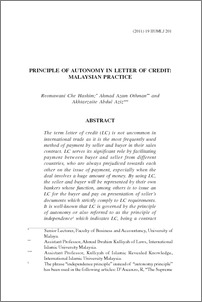Othman, Ahmad Azam
(2011)
Principle of autonomy in letter of credit: Malaysian practice.
IIUM Law Journal, 19 (2).
pp. 201-242.
ISSN 0128-2530
![[img]](http://irep.iium.edu.my/style/images/fileicons/application_pdf.png)  Preview |
|
PDF (Principle of autonomy in letter of credit: Malaysian practices)
- Published Version
Download (433kB)
| Preview
|
Abstract
The term letter of credit (LC) is not uncommon in
international trade as it is the most frequently used
method of payment by seller and buyer in their sales
contract. LC serves its significant role by facilitating
payment between buyer and seller from different
countries, who are always prejudiced towards each
other on the issue of payment, especially when the
deal involves a huge amount of money. By using LC,
the seller and buyer will be represented by their own
bankers whose function, among others is to issue an
LC for the buyer and pay on presentation of seller’s
documents which strictly comply to LC requirements.
It is well-known that LC is governed by the principle
of autonomy or also referred to as the principle of
independence1
which indicates LC, being a contractof payment is totally separate from the underlying
sales contract. Banks are concerned with documents
only and not with the goods. LC transaction can be
governed by the Uniform Custom and Practice for
Documentary Credit, known as the UCP through
express incorporation which provides the rules
relating to LC matters and is adopted in almost all
LC transactions. This paper discusses the nature,
background and significance of principle of
autonomy in LC transaction. In elaborating the
provisions on the principle of autonomy in the UCP
600, comparisons between relevant articles in the
UCP 500 are highlighted. The discussion also focuses
on relevant case law and on the application of the
autonomy principle in conventional and Islamic LC.
The paper concludes with the finding that Malaysian
bankers fully subscribe to the principle of autonomy
as outlined by the UCP 600
Actions (login required)
 |
View Item |


 Download Statistics
Download Statistics Download Statistics
Download Statistics